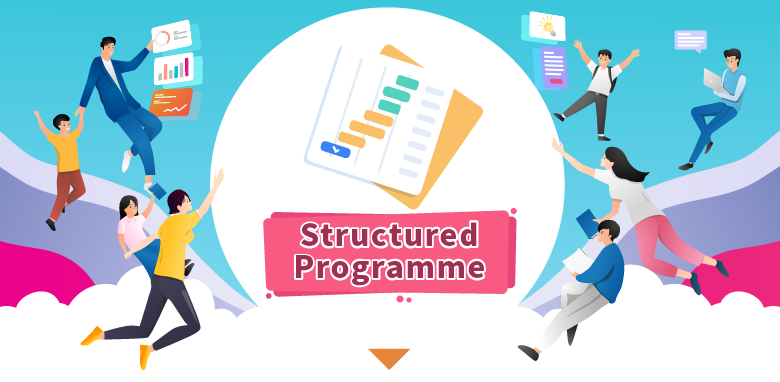1. Orientation Session
Introduction to objectives of the Programme (one session)
- To help students, mentors and parents/guardians understand the objectives of the Programme.
- To introduce students and parents/guardians to the mentors and the respective district organisers.
- To conduct pre-service assessment on mentees and parents/guardians.
2. Training Sessions
For Mentees
Basic training (compulsory):
-
Life planning (one session)
- To draw up personal development targets
- To make use of the donation and scholarship to implement the personal development targets
-
Capacity building (one session)
- To enhance self-understanding (including personal strengths, character and interests) and drive
- To enhance motivation, resilience and problem solving skills
-
Financial planning (one session)
- To acquire basic financial planning concepts and skills to facilitate achievement of personal development plans
Basic training (elective):
- Language skills enhancement
- Development of interests (Sports, music, arts)
- Social skills and etiquette
- Guidance for further studies
- Guidance and support on physical and mental health
For Mentors
Understanding youth and mastering mentor’s role and skills (one session)
- To provide general briefing on the characteristics of the youth, including their needs during different development stages, with emphasis on junior secondary students from underprivileged backgrounds
- To explain the role of mentors under the Programme, and provide advice on the dos and don’ts in arranging job shadowing, experience sharing and other interactive activities for the mentees
- To provide training on mentoring skills, with particular focus on goal-setting and financial planning
For Parents/Guardians
Parenting and communication skills (one session)
- To enhance communications, emotional support skills and parenting skills
- To encourage parents/guardians to engage in their children’s life planning and financial planning
3. Mentor-Mentee Interactive Sessions (no less than 12 sessions)
-
Face-to-face sessions, including visiting the workplace, for the following purposes:
- To assist mentees to formulate personal development plans with specific development goals and financial plans to achieve the specific goals;
- To actively listen to mentees’ needs and give them time and guidance to explore their own solutions; and
- To share life experience, arrange visits to the workplace to broaden the horizons of mentees and invite them to join other activities to widen their social network.
-
Participation in assessment and basic training sessions for the following purposes:
- To align expectation through a joint basic training session [See also item 2];
- To consolidate learning experience and the relationship between the mentors and mentees; and
- To conduct post-service impact assessment on mentees.
-
Joint participation in group activities [See also item 4]
-
Joint participation in graduation ceremony [See also item 5]
-
Communications via telephone or social media
Note: Except for the orientation session, assessment sessions, visit to workplace and graduation ceremony, the combination of the remaining interactive sessions (i.e. face-to-face sessions, basic training sessions and group activities) can be adjusted according to actual situation.
4. Group Visits
-
Types
- Visiting enterprises in different sectors and interactions with management personnel, such as:
- traditional big names;
- emerging new enterprises; and
- enterprises of Hong Kong brand products
- Visiting facilities of the Government, public bodies, public utilities, etc., such as:
- headquarters of Hong Kong Observatory and Civil Aviation Department;
- Science Park, Cyberport and Hong Kong Productivity Council;
- Hong Kong Palace Museum;
- training facilities for elite athletes;
- MTR facilities;
- airport facilities;
- electricity supply facilities; and
- disciplinary service facilities
- Joining activities offering special experience (such as flight experience)
- Joining study and exchange programmes outside Hong Kong
- Participation in volunteer services
- Visiting enterprises in different sectors and interactions with management personnel, such as:
5. Graduation and Extended Networking
-
Graduation ceremony
- To give recognition to all participants, including donors, mentees and their mentors
- To award scholarship of $5,000 to each mentee who successfully completes the Programme
-
Alumni Club
- Upon completion of the one-year intensive foundation programme, mentee graduates will become members of the Alumni Club automatically and further participate in diversified activities to be arranged by the Alumni Club to expand their social network and horizons
- Mentee graduates reaching the age of 16 will be invited to participate in the job tasting/internship programme coordinated by the Alumni Club


